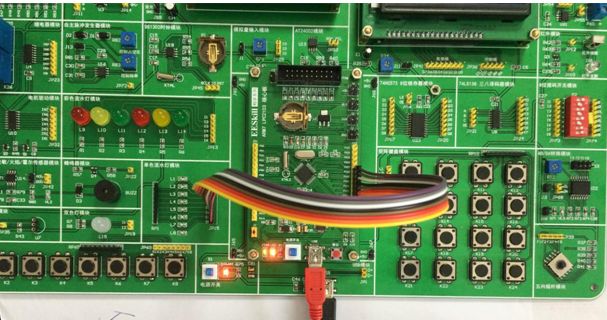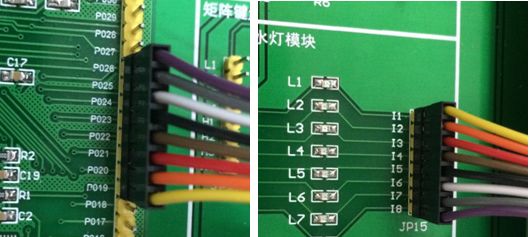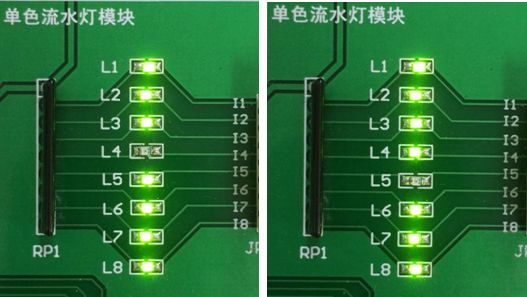1. Monochrome water light test Hardware Preparation: 8P DuPont Line 1 Wiring instructions: Use a 8P DuPont cable to connect the ARM core board P019~P026 to the bottom plate of the monochrome water lamp module JP15. Jumper Description: None They are: P019-I1, P020-I2, P021-I3, P022-I4, P023-I5, P024-I6, P025-I7, P026-I8. Experimental phenomenon: 8 LED lights turn off The source code resources are as follows: /*****************LPC2103 GPIO Water Light Experiment ***************** System Settings: Fosc, Fcclk, Fcco, Fpclk #define Fosc 12000000 #define Fcclk (Fosc * 5) #define Fcco (Fcclk *4) #define Fpclk (Fcclk / 4) * 4 Fpclk=60000000 Wiring instructions: Use a 8P DuPont cable to connect the ARM core board P019~P026 to the backplane monochrome water lamp module JP15, respectively: P019-I1, P020-I2, P021-I3, P022-I4, P023-I5, P024-I6, P025-I7, P026-I8. Phenomenon: LED lights turn off Technical Website: http:// Taobao shop: http://cepark.taobao.com Author: eeskill Time: 2017.07.01 ************************************************** ****/ #define IN_MAIN #include "config.h" #include "LPC2103_lian.H" #include "ADC.h" #include "ExtInterrupt.h" #include "I2C.h" #include "IAP.h" #include "Legacy_GPIO.h" #include "RTC.h" #include "SPI.h" #include "SSP.h" #include "Time.h" #include "UART.h" #include "WatchDog.h" #include "ISR.h" #pragma import(__use_no_semihosting_swi) Const uint32 tab[]={ 0x01, 0x02, 0x04, 0x08, 0x10, 0x20, 0x40, 0x80, 0x40, 0x20, 0x10, 0x08, 0x04, 0x02, }; Uint32 i; Void IRQ_Exception(void) { } //**********************Function Definition************************ Void delay(uint32 dly); //**********************Main function************************ ** Void Main(void) { TargetInit(VPBDIV_DATA, PLLCFG_DATA, MAMTIM_DATA); // don't delete While((PLLSTAT & (1 << 10)) == 0); // can delete P019_gpio; //Set the port to gpio port P020_gpio; P021_gpio; P022_gpio; P023_gpio; P024_gpio; P025_gpio; P026_gpio; //p019-p026 is set to output Gpio_out(p019|p020|p021|p022|p023|p024|p025|p026); Delay(1); While(1) { For(i=0;i<14;i++) { IO0PIN=(IO0PIN&0xF807FFFF)|(uint32)(tab[i]<<19); Delay(900); } } } //************************Delay********************** **** Void delay(uint32 dly) { Uint32 i; For(;dly>0;dly--) { For(i=0;i<5000;i++); } } Electronic Components Transformer
Transformer is a device that USES the principle of electromagnetic induction to change the ac voltage. Its main components are primary coil, secondary coil and iron core.The main functions are: voltage transformation, current transformation, impedance transformation, isolation, voltage stabilization (magnetic saturation transformer), etc.According to use can be divided into: power transformer and special transformer (electric furnace change, rectifier, power frequency transformer, voltage regulator, mining, audio transformers, intermediate frequency transformer, high frequency transformer, impact transformer, instrument transformer, electronic transformer, reactor, transformer, etc.).The circuit symbol T is often used as the beginning of the number. Examples: T01, T201, etc.
Electronic Components Transformer, Electrical Transformer, AC Transformer, 12V Transformer YANGZHOU POSITIONING TECH CO., LTD. , https://www.cnpositioning.com

